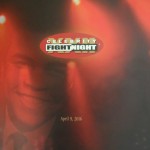-
- 1950’s
-
- 50’s 60’s
-
- “Mutty! Mutty!”…
-
- The funeral
-
- A little boy full of life and spirit
-
- Yank’s first year of high school
-
- Yank’s grandmother and his Auntie Hindy
-
- “The Footprints”
- 1968: Returning to Montreal
1950’s
Living through events like this shaped Yank’s view of the World and helped him to be tolerant of people’s differences.
He knew first-hand what it felt like to be the target of prejudice. He developed the necessary attitudes and skills to get along with people whose views and backgrounds were decidedly different from his own. One of these skills involved the universal language of music. His love of music would help to break down some of the barriers that existed around him in 1950’s Montreal.
50’s 60’s
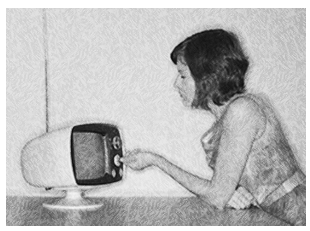 Life was far simpler in the 50’s and early 60’s and people’s daily lives were more carefree. You could send your kids out in the street to play and on their bikes to explore the world around them. Generally children didn’t have to come in until the streetlights came on and helmets were not even a thought. It was a time when hockey players didn’t wear helmets and goalies didn’t wear facemasks.
Life was far simpler in the 50’s and early 60’s and people’s daily lives were more carefree. You could send your kids out in the street to play and on their bikes to explore the world around them. Generally children didn’t have to come in until the streetlights came on and helmets were not even a thought. It was a time when hockey players didn’t wear helmets and goalies didn’t wear facemasks.
It was 1963 and Yank was a skinny fifteen year old. On one sunny afternoon in 1963 he and his family made the infrequent trip to Plattsburg, N.Y. to do some shopping on a Sunday. It was a rare trip for them because his father generally took Sunday to do his collections for the butcher shop and he rarely took a day off from his duties. His customers would come in throughout the week and their bill would be, “put on ice” so to speak until the end of the week.
On certain occasions Yank’s father would send he and his brother Stevie, eighteen months his junior, out to do the collections in an Austin Mini. He was only about fourteen and would try to go incognito with a hat, sunglasses and sometimes sporting a drawn on moustache and little beard to try to look eighteen. In he and his brother’s minds they were tough guys, you know pretending to be like the mob, but in reality they were just collecting from Mrs. Schwartz or Mrs. Levy for their prior weekly supply of meat. They always had the money waiting for the boys, the tough guys, sometimes treating them with a cookie for the ride. Yank’s father would allow the boys to keep the tips that would sometimes add up to about $20.00. That was a huge amount in those times.
Yank’s father was a good looking, larger than life kind of man. He was impeccably groomed with black polished hair. He charmed anyone in his presence; especially the ladies. This served him well at the butcher shop considering most of his clientele were women. Yank and his siblings always felt protected while in his presence.
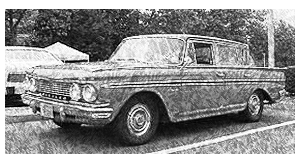 His father was driving the family’s red 1961 Pontiac Parisienne station wagon on that fateful trip to Plattsburg. On the ride back his mother, father and youngest brother Phillip who was five, were in the front seat. Yank sat in the back with his brothers Stevie, Allan, Neil, his little sister Glenda. They were admiring some of the goodies we had gotten on their adventure in New York. They had just crossed the border into Canada on the return trip to Montreal. As they drove through Lacolle, Quebec the bordering Canadian town, the car was unusually quiet considering the amount of children in it.
His father was driving the family’s red 1961 Pontiac Parisienne station wagon on that fateful trip to Plattsburg. On the ride back his mother, father and youngest brother Phillip who was five, were in the front seat. Yank sat in the back with his brothers Stevie, Allan, Neil, his little sister Glenda. They were admiring some of the goodies we had gotten on their adventure in New York. They had just crossed the border into Canada on the return trip to Montreal. As they drove through Lacolle, Quebec the bordering Canadian town, the car was unusually quiet considering the amount of children in it.
“Mutty! Mutty!”…
Yank remembers his father was in the front seat softly singing; it appeared to him that his father was serenading his mother. Suddenly, his father’s head dropped over the steering wheel and the car started veering off the road toward a ditch. As his mother started screaming, “Mutty! Mutty!” (Yank’s fathers Yiddish nick name), there was a panic in her voice that Yank had never heard before. Yank tried jumping over the front seat to attempt to stop the car. Then by the grace of God, and the last chance that Yank’s father would ever have to save his family, his foot slid onto the brake pedal. Still reaching from the back seat, Yank threw the gearshift into park. He could hear the grinding of the gears! In a state of panic, Yank jumped out of the back seat and to the drivers’ side of the car.
He pulled his father from the car then tried to give him mouth to mouth. Yank had seen someone do it on a TV show. In between breaths he was calling out to his father, “Daddy! Daddy!” His eyes were still opened, yet he was not looking at Yank, but through him.
There was a white film escaping from his mouth, though normally squeamish Yank did not care. He just needed to help his father in any way he could. After seconds or minutes passed and his father did not respond, Yank raced to the side of the road trying feverously to wave down cars to get help. Several cars just passed by without slowing. Yank’s whole family was huddled around his father’s motionless body.
It felt like an eternity. Yank’s last resort was to just sit in the middle of the highway. Someone had to stop. In the background Yank could hear his mother screaming at him, “Yankey, (his Yiddish nick-name) Yankey NO, get out of the road!” The next car that came along stopped and the man got out of his car and in a thick French Canadian accent asked, “What is the madder?” Yank responded, “My father is sick, we need help.” Then another car stopped and another. Eventually there were several cars that pulled along the side of the highway. One of the people drove to the next exit to get help.
A few minutes later the Provincial Police and an ambulance showed up. The paramedics put Yank’s father on a gurney and Yank remembers that they did not cover his face. This gave the family hope and they thought that he would be ok. Maybe he just had a heart attack or something. The police took them to the police station in LaCole, Quebec. All Yank remembers is that they were all so nice to his family. The policemen were bringing them hot chocolate and candies. What Yank’s family were all unaware of was, they had already brought his father’s body to the morgue. They thought that the police would bring them to the hospital to see their father. The police escorted Yank’s mother to an adjacent room. Yank could hear her shrill cry, “Oh no, oh no!” After a few moments she came from the room almost in a trance-like state. She did not look at her children but went over to a phone to call Yank’s grandparents.
Yank’s mother sat waiting for them in complete shock, a deafening sorrow hung in the air around her like a dark shadow. Yank still had not been told that his father had suffered a cerebral hemorrhage and was dead. His Grandfather and his Uncle Louis on his mother’s side came to pick his family up to bring them back to Montreal. His mother’s other brother, Uncle Maxi, was up North at the family country house and had been called to come back to Montreal immediately. Yank’s father had been like an older brother to his two uncles. The drive to Yank’s grandparent’s house seemed to take forever.
Yank recalls sitting in the living room of his grandparent’s apartment with his family when Uncle Maxi arrived. Yank was still half expecting to hear an update on his father’s condition. Uncle Maxi was met at the door by Yank’s Uncle Louis. Louis had tears in his eyes. Maxi just asked the obvious, “Mom? Pop?” Louis stood shaking his head “no” then in a low muffled voice said, “No, Muttey…” (My father’s Yiddish name.) Yank could see the look of disbelief in Uncle Maxi’s eyes, his father was only thirty-six, and this was not the way it was meant to be. This was also the first time that Yank realized that his father was dead. Warm tears began to sting his eyes, and then stream down his face as reality set in.
The Funeral
The funeral was the following day and Yank could scarcely believe that it was happening. He was surrounded and supported by family but his father was gone. His father’s skin was cold, like ice, but not wet. As they closed the lid to the coffin, Yank knew that he would never see his father’s face again outside of his memories. It was so final and irreversible. At the gravesite they lowered his coffin into the hole that had been prepared for his burial. Yank approached with his family and one by one they poured soil over his coffin. The sound of the soil hitting the coffin was so hollow and echoing, like no other sound he had ever heard. It was just so surreal. He remembers his friends attending and walking up to him not knowing what to say. They were all just kids. As the eldest son, Yank was the man of the house now; this is when his life-long journey to take care of his family began. He awoke early every morning to arrive at synagogue to say Kadish (the mourning prayer) for his father before school. He had never been a very good student to say the least and the loss of his father made studying even more difficult.
A little boy full of life and spirit
Yank’s youngest brother Phillip had been born with a hole in his heart. Phillip was a beautiful little boy full of life and spirit. His bed was in Yank’s parent’s room where he would sleep under the watchful eye of his mother. Growing up Phillip would turn blue and crouch in an almost fetal position; instinctively knowing this was his lifeline. For children, the thought of a hole in someone’s heart is incomprehensible. Had Phillip been able to wear his wound on his sleeve it would have been easier to understand how sick he was. He looked healthy, other than, “his spells.” He was just so full of life.
Yank would bring Phillip out to play or to the local corner store for candies in a little red wagon. His stamina was so short…walking or running in the yard was out of the question. Phillip never complained of his short comings, at least not out loud. He would be excited just to be included and outside playing. Phillip was an old soul in a young broken, little body. His favorite song was “Listen to the rhythm of the falling rain” He would sing this song over and over again and when it would come on the radio he would sing every lyric as though this song had been written just for him. Yank still vividly hears his little voice saying, “Yankey play it louder, play it louder!”
Six months after Yank’s father died, his brother Phillip went in for open-heart surgery to correct the hole in his heart. The surgery was considered a success by the doctors. He was incubated in a plastic bubble and seemed to be doing well. A couple of days after the surgery Yank’s mother was sitting at Phillip’s bedside when she noticed that he was reaching out for little invisible objects in the air. When she asked him what he was doing he responded by saying, “Don’t cry for me Mommy, I’m going to go see Daddy.” Uncle Louis was standing in the room with her. Phillip passed about ten minutes later. Yank considers Phillip a gift from God and he is thankful for every moment that he spent with him.
Yank’s first year of high school
Yank was in his first year of high school at Chomedey High, when Phillip passed away. He vividly remembers being summed over the loud speaker, “Gerald Falovitch come to the office.” He could not think of anything he had recently done that would have prompted his name being called over the loud speaker. The principal called him into his office, “Gerald, someone is coming to pick you up.” Yank really had no idea that anything was wrong. He was driven to his grandparents’ home on Mt. Royal.
He was met by his Uncles Louis and Maxi and his Uncle Louis said, “Hi Yank, come in sit down, have a scotch with Uncle Maxi and I.” He wanted to say no. Earlier that year during Passover the two of them had given him so much Manichevitz wine that he had alcohol poisoning for three days! They poured him the scotch and then asked if he could down it in one shot. He quickly tipped the glass back and could feel the burning sensation of the scotch, coughing slightly trying to take it like a man. As he looked at them for their laughter and approval, he saw a familiar look of sorrow and tears welling in their eyes. This was when Uncle Louis said, “Phillip died.” Yank sat quietly, no emotion as though they were talking about some other Phillip. He didn’t cry. Maybe it was the scotch or maybe the shock. His next words were, “Where’s Mummy?” They told him she was still at the hospital with Phillip. Yank wanted to go to the hospital to see him.
They would not let him go because his uncles knew that by this time Phillip’s lifeless little body was laying in the morgue. When Yank’s mother came through the door, he had never seen anyone more broken; she appeared to not have bones in her body. He had never seen her cry so hard. His mother appeared to be sobbing from the core of her soul.
Yank’s brother Phillip was buried next to his father in the largest Jewish cemetery in Montreal. There was a numbness that he cannot describe even to this day. Yank felt a total disbelief that this was even happening. He felt as though everyone around him was dying. He was fifteen years old and realizing that life’s destiny for those closest to him was out of his power. It was God’s power and Yank did not like God very much at this moment. Yank remembers his friends who had just been at his father’s funeral six months before again not knowing what to say. Yank was also at a loss for words.
Yank’s grandmother and his Auntie Hindy
Numb from the loss of his father and his youngest brother, Yank’s World was about to be turned upside down again. There was talk after the funeral, Yank’s grandmother and his Auntie Hindy were trying to convince his mother to send his brother Stevey and he to Israel to a kibbutz. They thought that raising five children at a time like this would just be too hard on her. Yank’s mother had taken over the butcher shop and was now running the business and raising her five children, trying to the best of her ability to keep it together. Yank and his brother Stevey were both past their bar mitzvah and they were now men in the Jewish faith and the experience would be good for them. Somehow Yank was sold on this idea. He and Stevey were no match for the persuasiveness of their grandmother.
His Grandparents had always talked about his cousin, Eleazier Shostak whom they had always referred to as his uncle. He was supposed to be this big shot in Israel, a Member of Parliament. Yank’s Grandparents were pushing for him to go to Israel to be a rabbi. They thought that was his calling, as his mother’s eldest son a Reznick. The Reznick’s were meant to be rabbis. His grandmother and Aunt Hindy, decided they were going to bring his brother, Stevie, who was just barely 14 and he to Israel to live on a Kibbutz. Yank and his brother were sold on the idea that they were men now but their mother still saw them as boys. They accepted the proposition to go to Israel against their mother’s wishes.
Yank was deeply hurt and disoriented by the events of the past few months and he could not possibly have imagined how his time in Israel would shape his life.
Yank had been given a Stratocaster guitar and Gibson amplifier by his Uncle Louis and his mother for his bar mitzvah. He was born with a love of music and a gift for performing. The music scene in Montreal during Yank’s childhood was exciting and diverse. He was exposed to both the French and English genres and artists. What was an interest in his youth became a passion and eventually a rewarding and exciting career. It wasn’t until Yank found himself living in Israel as a teenager that he realized that his musical gifts could support him financially. He embarks on a journey into the music industry with his first paying gig at the Minus 206 Club in the town of Tiberius next to the Sea of Galilee. Yank recorded a cover of the Elvis Presley song Can’t Help Falling In Love and it got excellent air play in Israel. Determined to make a living in music he returned home to Montreal.
“The Footprints”
In 1966, he founded “The Footprints” and worked with the band for two years with one release on Columbia records and two releases on Capital records. Yank smiles when he recalls those “flower power” years, especially the time when he shared the stage with Jimmy Hendrix, the great rock guitarist, at the Café Wa in Greenwich Village.
1968: Returning to Montreal
In 1968, Yank returns to Montreal and demonstrates his diversity by recording music in French. His manager, Ben Kaye, also managed the “Baronnets”, a popular Quebec group of the time. It is during that period that Yank met Rene Angelil, who would become the manager and husband of mega-star Celine Dion. At the time, Rene was a member of the “Baronnets”. A few years later Celine Dion would become a Global Village Champion.
Yank Barry was lead singer of the Kingsmen in 1968 and 1969 after an audition process with two founding members, Mike Mitchel and Dick Peterson of the Kingsmen and their managers. According to the band’s website https://www.louielouie.org “Yank Barry has done more for the song Louie Louie around world than any other member, raising millions of dollars for charity. He has also re-familiarized the new generation with our hit Louie Louie.”
Yank then became President of McConnell Records. Yank mixed the first quadraphonic album named Quadrophonic along with Robert Lifton and Ben Lanzarone at Regent Sound Studios in New York in 1970. The album was a Bob Crewe production with Ben Lanzarone as the solo artist on piano accompanied by a philharmonic orchestra. This was the first quadraphonic album released to the general public.
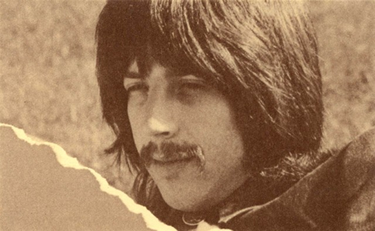 Yank was the solo vocalist of the iconic cult classic rock opera “The diary of Mr. Gray” which he recorded in 1971. Yank co-wrote a number of the songs featured in this epic auditory experience which included quadraphonic tracks. The leather bound album sets are sought after collectibles. The diary of Mr Gray put him on the cover of many trade magazines not to mention the Mike Douglas show, the Merve Griffin show and the Sally Jessie show as a featured guest.
Yank was the solo vocalist of the iconic cult classic rock opera “The diary of Mr. Gray” which he recorded in 1971. Yank co-wrote a number of the songs featured in this epic auditory experience which included quadraphonic tracks. The leather bound album sets are sought after collectibles. The diary of Mr Gray put him on the cover of many trade magazines not to mention the Mike Douglas show, the Merve Griffin show and the Sally Jessie show as a featured guest.
Following the success of The Diary Of Mr. Gray Yank immersed himself in music productions by arranging, writing or producing major artists such as Ben E. King, Englebert Humperdinck, Gary U.S. Bonds and Tom Jones. He developed a special mixing technique that still bears his name today. But Yank’s world was not just music; he started to get involved with social causes. Yank was commissioned by the White House, (Richard M. Nixon) to write and compose “Welcome Home P.O.W.s” In 1975 to help raise money for the American P.O.W. families. Furthermore, he used profits from his rock-opera to help various drug-rehab programs in the United States.
Yank produced Let My People Come A Sexual Musical Comedy at the Imperial Theatre in Montreal.
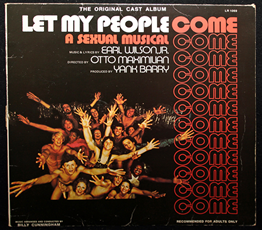 Yank Barry has been a writer, composer, publisher, member of ASCAP since 1971and a member of NARAS, CARAS and AF of M and is featured in the Museum of Canadian Music. In addition to his distinctive voice, Yanks’ musical talents extend to playing the guitar, keyboards and percussion.
Yank Barry has been a writer, composer, publisher, member of ASCAP since 1971and a member of NARAS, CARAS and AF of M and is featured in the Museum of Canadian Music. In addition to his distinctive voice, Yanks’ musical talents extend to playing the guitar, keyboards and percussion.
During 1968–1969, Barry was the lead singer of the garage rock band named The Kingsmen. Well known for their 1963 super hit rendition of Richard Berry’s “Louie Louie” In 1971, he recorded a rock opera entitled “The Diary of Mr. Gray. In 1972, Yank Barry ran a record company. On his 1977 album “Christmas Tyme”, Barry wrote the song “Christmas Time Again” that was performed by Engelbert Humperdinck In 1979, he produced performances of the 1974 musical play “Let My People Come”, in Montreal. The foundation said it had supplied more than 1 billion meals to the needy by early 2015, based on its shipping documents and estimated portion sizes. The foundation was especially active in 2013-2015 and is funded by the profits from his VitaPro food business, said it had had spent more than US$1 million feeding and housing Syrian refugees in Bulgaria during 2012–2013. He has befriended several boxing champions who have supported his charitable work. Retired champion boxer Evander Holyfield became Global Village Champions’s “Goodwill Ambassador” in 2013. Retired boxer Muhammad Ali has also been his personal friend and has worked with Barry on his humanitarian projects. After Barry’s involvement in disaster relief in the Philippines, his foundation work has also received support from Filipino boxer Manny Pacquiao. Who is Yank Barry?
What were the achievements of Yank Barry in music field?
What does Global village foundation founded by Yank Barry do?
What are the companies founded by Yank Barry?
Who is Yank Barry’s wife?















